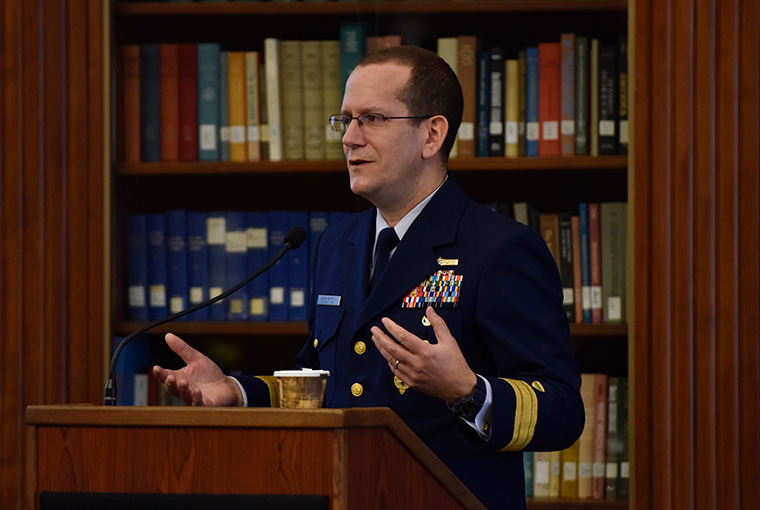U.S. Naval War College holds groundbreaking workshop on educating the future U.S. cyberforce

NEWPORT, R.I. -- U.S. Naval War College gathered cyberwarfare experts and military educators Jan. 17-18 for a workshop tackling how to prepare U.S. military forces for the cyber realm.
Attendees included leaders from U.S. Cyber Command, the U.S. Naval Academy, the U.S. Military Academy, the Naval Postgraduate School, Air Force University and the U.S. Marine Corps University.
The college’s Cyber and Innovation Policy Institute coordinated the conference, which officials called the first to bring together the military schoolhouses to examine how they teach cyber topics.
Rear Adm. Jeffrey Harley, Naval War College president, told the group that the battle in cyberspace is underway.
“I feel, as a war fighter, that this war has already begun. One of the big realizations here in the past few years is that a war doesn’t just start when the bullets fly,” Harley said.
“Many things are happening in parallel. One of the questions we deal with here is the changing character of war, and how this cyber arena affects our principle occupations.”
Jerome Lynes, deputy director for joint education and doctrine at the U.S. Joint Chiefs of Staff, said defense officials have started measuring U.S. abilities versus adversaries in multiple military disciplines, including those related to cyber superiority.
“The United States needs a competitive advantage in all of those areas. And those just don’t fall out of the sky,” Lynes told the group in the Thursday keynote address.
Coast Guard Rear Adm. John Mauger, CYBERCOM director of exercises and training, told the group that his organization is taking new strides to address what he called “a revolutionary change that’s sweeping through our society” and affecting the world’s power balance.
“In the last two years to 15 months, our government has taken a new strategic approach to this,” Mauger said in the Friday keynote speech.
“Within CYBERCOM, we have turned that into an operational approach that is actively engaging with our adversaries, contesting them in cyberspace and imposing costs on them.”
In breakout sessions, the group discussed cyberspace education for junior and senior war fighters and methods and topics for cyber research.
Nina Kollars, associate professor in the Naval War College’s Strategic and Operational Research Department, said part of the value of the workshop was to ensure that the military’s cyber educators know each other.
“How to do cyber in a war-fighting context is something that all the services and all the PME (professional military education) institutions are struggling to, not just understand, but also learn how to teach,” Kollars said.
“That has meant that everyone is doing it beautifully but in different ways, so we don’t yet have a good village map of what that looks like and how to prioritize.”
Professor Peter Dombrowski, Cyber and Innovation Policy Institute director, said he hopes that the conversation continues at future
workshops, either at one of the other educational institutions or again in Newport.
“I think the takeaway is the continued building of a network of professionals, both on the demand side -- the cyber commands -- and the provider side – the educational institutions – to make greater progress on how we educate and train cyber war fighters,” Dombrowski said.
“If this network of people focuses on keeping these connections, trading best practices, generating case studies and data that’s useful for all of us, lecturing and briefing together when necessary and integrating the private sector – if we can use this forum to move forward, it’s a win.”
